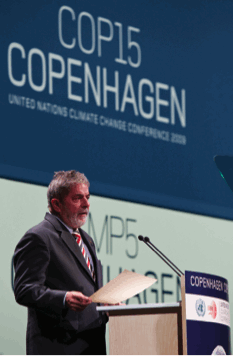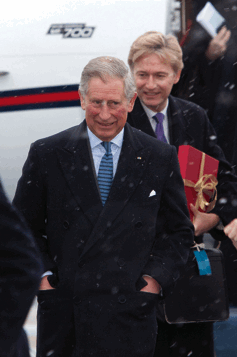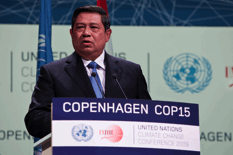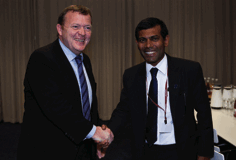Many Countries, Many Voices
Air Date: Week of December 18, 2009

Luiz Inacio Lula da Silva, President of Brazil, address the conference of parties in Copenhagen. (Photo: Courtesy of COP15)
Leaders and delegates from vulnerable islands and low-lying countries urge action to save their lands from disaster, but it often seems that self-interest is more powerful. Yet there have been some progress on ways to curb emissions from deforestation and protect the rain-forest. Host Steve Curwood samples opinions from experts in the environmental movement.
Transcript
CURWOOD: It’s Living on Earth. I’m Steve Curwood at the U.N. climate summit negotiations in Copenhagen.
Coming up, analysis and some of the speeches from the 130 heads of state or government, who came to the Danish capital to hammer out a climate deal.
But first, for two weeks 18 thousand people, representing more than 190 nations, came together to work, eat, and basically live in the vast Bella Conference Center on the outskirts of Copenhagen. Here are some of their voices:
FUENTES: Me llama Carolina Fuentes, de la nacion de Mexicana. The single most important point, in order to have a strong agreement, we would say financing.
ÅARMARK: My name is Ernst Erich Åarmark from Sweden. The very most important thing is of course to have very stable agreement.
XIAO-YE: My name is Jiang Xiao-Ye with the Chinese delegation.
[XIAO-YE SPEAKING CHINESE]
TRANSLATOR: I think the most important thing is that we hope that every party comes here to achieve an agreement to contribute to the efforts of tackling climate change.
[GUILLAUNE SPEAKING FRENCH]
TRANSLATOR: All states must talk about the future of the world, and not each state and position.
[WOMAN SPEAKING XHOSA]
TRANSLATOR: I think the most important thing is for countries, especially rich countries, to realize and acknowledge the need to support the second world countries.
CURWOOD: Now government climate change experts have been working on an agreement for years. But midway through this historic meeting the cabinet secretaries and ministers took over. And for the last three days the V-V-I-P’s showed up: the presidents, and prime ministers and princes -- each given a few minutes to address the world. Among the first, Charles, the Prince of Wales.

Prince Charles (Photo: Courtesy of COP15)
PRINCE OF WALES: We cannot have capitalism without nature’s capital. We cannot sustain our human economy without sustaining nature’s economy.
CURWOOD: Prince Charles tapped into what was perhaps the most successful part of these negotiations: what’s called REDD, a new U.N. plan that would reduce CO2 emissions from the destruction of the world’s tropical forests.
PRINCE OF WALES: These ecosystems have been described as the planet’s lifebelt and with good reason. Not only do they harbor about half of our terrestrial biodiversity and generate much of the rainfall that is vital for farming, they also absorb and hold vast quantities of carbon that would otherwise be in the atmosphere.
Unfortunately, the forests are being cleared at a terrifying rate. The simple truth is that without a solution to tropical deforestation there is no solution to climate change. As it turns out, it seems that the quickest and most cost effective way to buy time in the battle against catastrophic climate change is to find a way to make the trees worth more alive than dead.
CURWOOD: Tony Juniper helped write Prince Charles’ speech and works for the Prince’s Rainforest Project.
JUNIPER: Prince Charles has been campaigning on these issues for forty years, and the thing that really got him determined to do something about rainforests was meetings he was having with climate scientists in 2007, who said to him that it’s not going to be possible to do a two degree target unless we do something about deforestation.
He looked at the science, he looked at the implications for rainfall for food security – never mind all the issues we know about for wildlife and biodiversity – and also his great respect for the world’s indigenous communities encouraged him to act. And so, he brought together his Rainforest Project, which I’ve been lucky enough to work with these last couple of years, and we’ve been crafting, in hopefully a constructive way, the opportunities for people to come together and form a consensus about how we might proceed, and they’re talking about it here in Copenhagen, and that’s fantastic.
CURWOOD: So, REDD made a lot of advances during the Copenhagen conference of the parties on climate. Why so?
JUNIPER: I think it was one of the things that was inadvertently left out at the time of the Kyoto Summit, when it was decided that avoided deforestation wouldn’t be a part of the process, and there were many different reasons for that. Not least the idea that the industrialized countries should go first in terms of cutting emissions and the tropical countries should be left out of the framework. But I think people have reflected long and hard on this particular subject over those years. And a lot of tropical countries – they actually would like to keep their rainforests and they would like to have that resource there. They’re not clearing them away for reasons that are frivolous, they’re doing it because of the economics of their country’s development pathways, and so they’re having to do it.
They’d rather not do it, and in many cases they thought it was about having a different pathway that could keep one of the principle assets that they have. Namely, these incredible ecosystems that generate rainfall, that harbor biodiversity, that are a potential source of renewable income for centuries into the future. And also, of course, you know, that the western countries are looking for ways in which global emissions could be reduced, without too much pressure on their industrial emissions, it looked like a good deal for them, too.
CURWOOD: President Lulu DeSilva of Brazil spoke to this issue and he put some numbers on the table:
[DESLIVA SPEAKING PORTUGUESE]

Luiz Inacio Lula da Silva, President of Brazil, address the conference of parties in Copenhagen. (Photo: Courtesy of COP15)
TRANSLATOR: The Amazon is a great heritage of the people that live here, and that’s why our commit to reduce its deforestation 80 percent until the year 2020. The Brazilian national congress has just passed my draft bill that has a scent of action that involves fighting deforestation, agriculture, energy, and steel industry. These measures will reduce the growth of Brazilian emissions of greenhouse gas effect between 36 point one percent to 38 point nine percent until the year 2020. This effort will cost us 160 billion dollars, that is to say, 16 billion dollars per year until the year 2020. But this is not a proposal that we’re putting on the bargaining table, this is a commitment that we are taking as a Brazilian nation, and with the world.
CURWOOD: Those numbers you just heard, is that adequate for the job you think that needs to be done?
JUNIPER: We’re certainly getting into the kind of numbers that could make a difference and I think one of the things that has dogged global attempts to slow down deforestation over the years has been the insufficient resources to match the economics that are causing the destruction. This is where the Brazilians have now gone. If you want to match the economic force of the timber demand, soya bean demand, leather and beef demand, you’ve got to match it with and equal and opposite economic force. And that’s why these numbers now are being talked about. I think we are getting into the right kind of ballpark. Whether it’s exactly what the president said, I don’t know, but certainly we’re talking tens of billions rather than handfuls of millions, which is where the world has hitherto been on this subject with project financing, not attacking the strategic underlying economic problems.
So, the fact that the Brazilians are saying this is amazing news for the world, and actually, it sounds like a lot, but it’s possibly the biggest bargain in history, in terms of what we get back for relatively small amounts of money. You know, that’s not even a fraction of what the British government’s just paid to bail out the banking system. This could bailout the entire planet.

Susilo Bambang Yudhoyono is the president of Indonesia. (Photo: Courtesy of COP15)
CURWOOD: Now, the president of Indonesia put some numbers on the table in terms of reducing emissions. Let’s listen:
PRESIDENT: In the spirit of thinking outside the box, in September of this year, Indonesia declare emissions reduction target of 26 percent from business as usual, by 2020.
This can be increased to 41 percent with enhanced international assistance. As a non-annexed one country we did not have to do this, but we read the scientific warning of the IPCC. So, we set out new reduction target because we wanted to part of the global solution.
CURWOOD: 26 percent reduction in emissions, he says on his own dime, maybe as much as 41 percent if the rest of the world pitches in. How adequate is that compared to the need?
JUNIPER: Again, an amazing offer from a country that’s suffering very high levels of deforestation. And if one looks at the map of global deforestation right now, those two countries in the tropics account for most of it – Brazil and Indonesia. And indeed they’re right up there with the top of the league table of global emitters because of this clearance of land.
So again this is another amazing offer that the world would be foolish to let slip through our fingers at this meeting. If we can find the right kind of mechanism to bring these countries into an agreement. So, we need money now, and it was wonderful yesterday to see a group of countries coming together and saying that they would be prepared to pay in the next few years a substantial sum to countries that are embarking on reversing the deforestation pathways they’ve been on.
CURWOOD: President Obama says that he’ll put up a billion dollars of the three point five billion for this.
JUNIPER: The offer’s been put on the table been helpful. I think they’re still probably at the low end of what’s needed in this next period. There was an informal working group that was convened following a meeting hosted by the Prince of Wales in London in April to look at these very matters of how much money over what time scales – and they came with an estimate that between 15 and 25 billion euros, so more or less dollars the same kind of sums, would be needed between 2010, 2015 to cut down deforestation in the tropics by a quarter.
And so, you know, three and a half billion over the first bit of that five years sounds a little bit on the low side, but it’s good that people are now talking. At least we’ve got a discussion going with the right principles there, i.e., that the West will pay the southern countries for slowing down their deforestation as a matter of principle in terms of keeping those ecological services in tact. It’s not going to be linked to a carbon market, at least not now; it’s not going to be linked to any other conditionalities, it’s a way of helping the world cope with this big problem, and being done in a way that hopefully could deliver some quite big benefits.
CURWOOD: Now, what about the indigenous people? In Brazil, for example, some three percent of the population – indigenistas – are responsible for 25 percent of the land, and they’ve perhaps taken the best care of the land.
JUNIPER: The indigenous people are absolutely crucial to this in so many respects. And I think, you know, respect’s number one is the fact that history shows they are the best custodians of the land. If you look at a map of Brazil and the areas of deforestation that have occurred over the last fifty years or so, and look at where the intact forest remains – there is almost a 100 percent correlation to where the indigenous reserves are and where the rainforest is.
These people have managed to maintain the forest, not only because they have an indigenous title there that’s in a legal deed. These people have a very different view of the world; they see the forest as a scared presence that’s sustaining their culture in a very fundamental and spiritual way.
They don’t see the forest as a source of natural resources, which is just about how everybody else sees it. Looking at it from a more kind of human rights point of view, these people have to be part of the process, because like everybody else they have to have a voice in something that fundamentally affects them.
And so, that then is where it gets very complicated because lots of countries have different relationships with their indigenous people. In New Guinea, perhaps you have one of the best examples of where the indigenous people still control the forest. In other countries the indigenous people, you know, are not legally recognized. And I’ve heard Malaysian ministers saying that over the years, for example.
So I think the indigenous thing will probably have to be on a case-by-case, country-by-country approach, but I think if the donor community is having a conversation with the individual rainforest countries this is one of the things they really must bring to the table.
CURWOOD: Tony Juniper, with the Prince’s Rainforest Project, thank you so much.
JUNIPER: Thank you very much, indeed.
CURWOOD: Many leaders made impassioned speeches in Copenhagen. Here’s one from the President of the Republic of Maldives, Mohammed Nasheed.

The prime minister of Denmark, Lars Lokke Rasmussen greets Mohamed Nasheed, president of the Maldives. (Photo: Courtesy of COP15)
NASHEED: Climate change negotiations have nothing – nothing at all to do with money. Maldives is a very small state. We have never received aid from European Union countries. Whatever we’ve been able to do we have been able to do with our friends and neighbors, and we have been able to fend for ourselves. Climate change negotiations have for me and for our country everything to do with our grandchildren. I have two daughters – I want to see grandchildren. If we continue business as usual we will not be able to see our grandchildren. To assume that climate change has anything to do with money is in my mind the height of arrogance.
CURWOOD: I discussed President Nasheed’s remarks with Stephanie Tunmore. She’s an organizer with Greenpeace International.
TUNMORE: I think that the president from the Maldives gave, as usual, a very emotional speech. And it’s a very emotional issue for small island states, and for low-lying delta areas. Because basically, they’re negotiating their survival, this is not just an exercise in moving chess pieces around a board for them. And as one of the island representatives said, they could become stateless by the middle of this century. That’s something that I think that people in the industrialized world can’t even contemplate, that they would lose their home, the land, have nothing and nowhere to go.
CURWOOD: The Prime Minister of Marshall Islands is feeling a lot of frustration that this process has not yielded enough to really protect the Marshall Islands. He’s talking about going to the international court of justice; he says, now, that his country is the subject of environmental crimes.

The low lying atoll nation of Maldives is immediately threatened by sea level rise. (Photo: Wikipedia)
TUNMORE: I feel his pain. I really do. I think it’s an indictment of the industrialized world that he feels compelled to do that, to seek justice through the courts. And it is criminal, the way that the rich countries are behaving. They created the problem, we’ve had negotiations now since Kyoto, since 1997, we’ve had a four-year process followed by a two-year process where countries have constantly committed to doing things that they end up not doing. And I think we’re seeing desperation now from those countries that they’re fighting for their survival – there’s no question.
CURWOOD: At the end of this process we don’t have the United States, China, all the nations of the world bound to a legally obligating instrument. How does this play for the small island states?
TUNMORE: I think you have to look at, for instance, the Bali Action Plan. That was a political agreement, and what happened? Pretty much nothing. There’s no trust left in this process, and the only way to make sure what is promised is delivered is to have something that’s legally binding. We need a treaty. We need an agreement where promises made are promises kept.
CURWOOD: Stephanie Tunmore with Greenpeace. Thank you so much.
TUNMORE: Thank you very much.
CURWOOD: Promises made, promises broken. That was the message from the president of the West African nation of Senegal, Abdoulaye Wade.
[WADE SPEAKING FRENCH]
TRANSLATOR: When I talk about promises I can say that I’ve attended many G8 meetings. If I count up all the sums promised it’s at least 200 billion dollars. Where are they? And when have they been implemented? That’s why I’d like to say that it’s all very well to have discussions, but I’d like to come down to our experience in Senegal. I don’t want to wait for promises any longer, I want to seek original solutions and as the great Greek philosopher said, I want to prove movement by actually walking. That is to get down to business.
SECK: I think that he’s right. It was a real speech. He say what coming from his soul.
CURWOOD: Emmanuel Seck is with Environmental Development Action in the Third World. He’s based in Dakar, Senegal. I asked him what he thought of President Wade’s speech.
SECK: He said that he will not talk about money. He will talk about what we can do, and what we are doing. We’ll not wait; we’ll do our development ourself. If they want to come and join us, we will walk together with them, and I think that it is the sense of his message. People are talking about the many promises, we’ll do that, we’ll put this on the table. So, all developed countries, many of them have promised to give a lot of money, but we are a little bit tired with these promises.
And then, we set up African local communities, let’s go together, let’s build on what we know and what we have, and then if someone want to join us, that will be a good thing.
CURWOOD: The president of Senegal says he’s starting an organization called Science Without Borders. What do you know about this, and what do you think it will try to do?
SECK: You know, we have, we are stricken by arid land degradation, we stricken by droughts. And then there are many scientists, for example, from Australia, some scientists from Israel, also who have made a lot of research in the desert. And if these people are ever able to join the process in Africa, they are welcome.
I think that it is this to get together all people are leading volunteer and who will – who are willing to work with Africa without any penny. We have many scientists in Africa, we have many engineer in Africa, we have also only to organize them and have good politics, good politics to bring them together, and to give them confidence that they could work for the countries and for their continent.
CURWOOD: Thank you so much, Emmanuel Seck is with Environment and Development in the third world, from Senegal.
SECK: It’s my pleasure.
Links
Living on Earth wants to hear from you!
Living on Earth
62 Calef Highway, Suite 212
Lee, NH 03861
Telephone: 617-287-4121
E-mail: comments@loe.org
Newsletter [Click here]
Donate to Living on Earth!
Living on Earth is an independent media program and relies entirely on contributions from listeners and institutions supporting public service. Please donate now to preserve an independent environmental voice.
NewsletterLiving on Earth offers a weekly delivery of the show's rundown to your mailbox. Sign up for our newsletter today!
 Sailors For The Sea: Be the change you want to sea.
Sailors For The Sea: Be the change you want to sea.
 The Grantham Foundation for the Protection of the Environment: Committed to protecting and improving the health of the global environment.
The Grantham Foundation for the Protection of the Environment: Committed to protecting and improving the health of the global environment.
 Contribute to Living on Earth and receive, as our gift to you, an archival print of one of Mark Seth Lender's extraordinary wildlife photographs. Follow the link to see Mark's current collection of photographs.
Contribute to Living on Earth and receive, as our gift to you, an archival print of one of Mark Seth Lender's extraordinary wildlife photographs. Follow the link to see Mark's current collection of photographs.
 Buy a signed copy of Mark Seth Lender's book Smeagull the Seagull & support Living on Earth
Buy a signed copy of Mark Seth Lender's book Smeagull the Seagull & support Living on Earth

